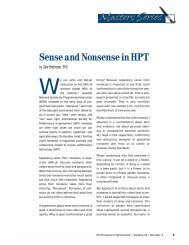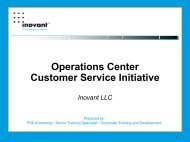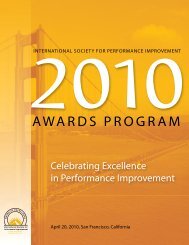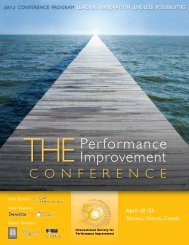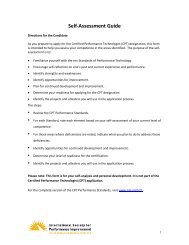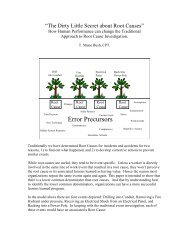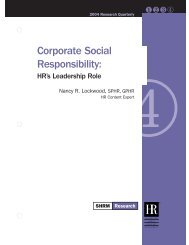Yes We Can! - International Society for Performance Improvement
Yes We Can! - International Society for Performance Improvement
Yes We Can! - International Society for Performance Improvement
You also want an ePaper? Increase the reach of your titles
YUMPU automatically turns print PDFs into web optimized ePapers that Google loves.
Forrester, J.W. (1978). Industrial dynamics--A major breakthrough <strong>for</strong> decision makers.<br />
Chapter 2 in Managerial Applications of System Dynamics. E.B. Roberts, (Ed.). Cambridge:<br />
The MIT Press.<br />
Fox, C. J. and Sulzer-Azaroff, B. (1989). The effectiveness of two different sources of<br />
feedback on staff teaching of fire evacuation skills. Journal of Organizational Behavior<br />
Management, 10(2):19,-35.<br />
Fox, D.K., Hopkins, B.L., & Anger, W.K. (1987). The long-term effects of a token economy<br />
on safety per<strong>for</strong>mance in open-pit mining. Journal of Applied Behavior Analysis, 20, 215-234.<br />
Foxx, R.M., & Bechtel, D.R. (1982). Overcorrection. In M. Hersen, R.M. Eisler, & P.M.<br />
Miller (Eds.), Progress in behavior modification. (Volume 13) (227-288). New York: Academic<br />
Press.<br />
Frase, L.T (1968). Questions as aids to reading: Some research on theory. American<br />
Educational Research Journal. 319-332.<br />
Frisch, C.J., & Dickinson, A.M. (1990). Work productivity as a function of the percentage of<br />
monetary incentives to base pay. Journal of Organizational Behavior Management, 7(1), 13-33.<br />
Fuller, P. (1949). Operant conditioning of a vegetative human organism. American Journal of<br />
Psychology. 62, 587-590.<br />
Gaasholt, M. (1970). Precision teaching in the management of teacher and child behavior.<br />
Exceptional Children, 37, 129-135.<br />
Garner, R. (1990). When children and adults do not use learning strategies: Toward a theory<br />
of settings. Review of Educational Research. 60 517-529.<br />
Garner, R. (1983). Externalizing question-answering strategies of good and poor<br />
comprehenders. Reading Research Quarterly. 18 (4) 438-447.<br />
Geller, E. S. (1989). Managing occupational health and safety: Marketing and the human<br />
element. Paper presented at the Fifteenth Annual Convention of the Association <strong>for</strong><br />
Behavior Analysis, Milwaukee, WI.<br />
Geller, E. S. (1988.) Managing Occupational Safety. Make-A-Difference, Inc., Blacksburg, VA.<br />
Geller, E. S. and Hahn, H. A. (1984). Promoting safety belt use at industrial sites: An<br />
effective program <strong>for</strong> blue collar employees. Professional Psychology: Research and Practice,<br />
15:553-564.<br />
Geller, E. S. and Lehman, C. R. (1991). The buckle-up promise card: A versatile intervention<br />
<strong>for</strong> large-scale behavior change. Journal of Applied Behavior Analysis, 24:9194.<br />
Gery, G. J., (1991). Electronic Per<strong>for</strong>mance Support Systems: How and why to remake the workplace<br />
through strategic application of technology. Boston: <strong>We</strong>ingarten Publications.<br />
Gersten, R., Keating, T. & Becker, W.C. (1988). The continued impact of the Direct<br />
Instruction Model: Longitudinal studies of Follow Through students. Education &<br />
Treatment of Children. 11 (4) 318-327.<br />
Gilbert, T. (1996). Human Competence: Engineering worthy per<strong>for</strong>mance. Amherst, Mass &<br />
Washington D.C.: HRD Press, Inc. & The <strong>International</strong> <strong>Society</strong> <strong>for</strong> Per<strong>for</strong>mance<br />
<strong>Improvement</strong>.<br />
36




